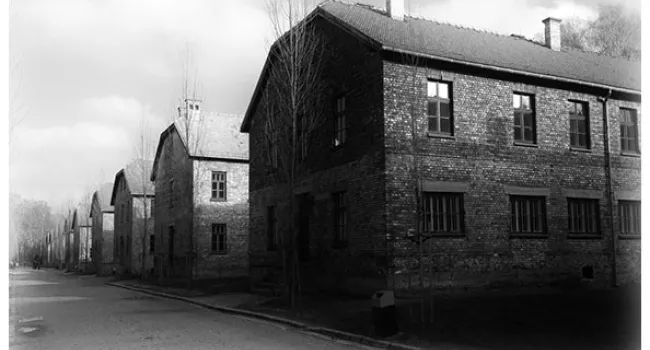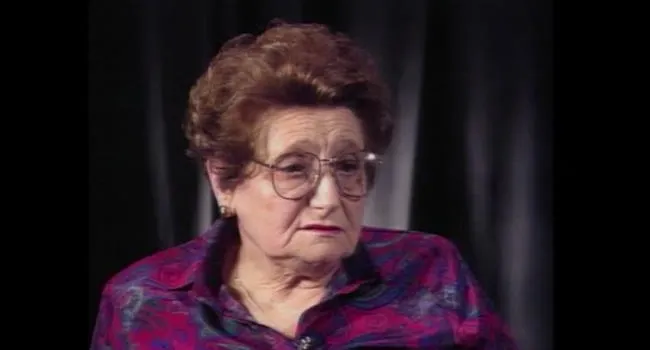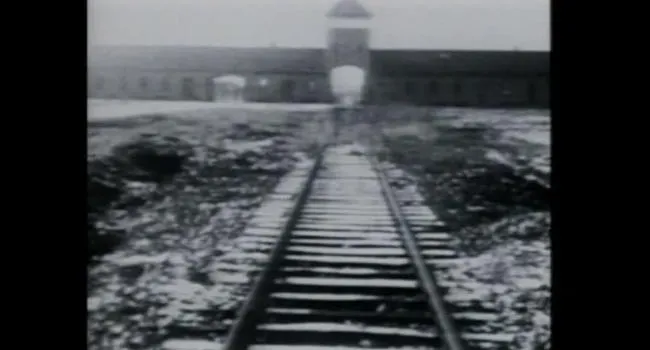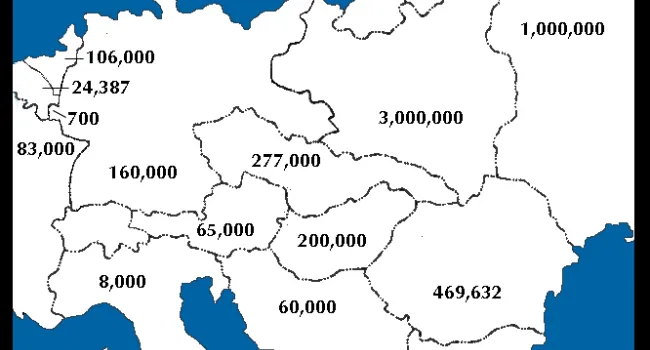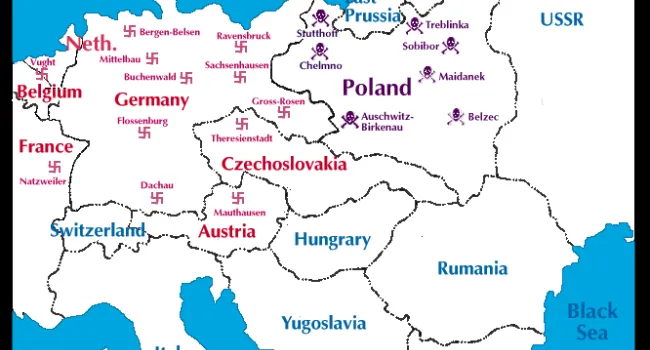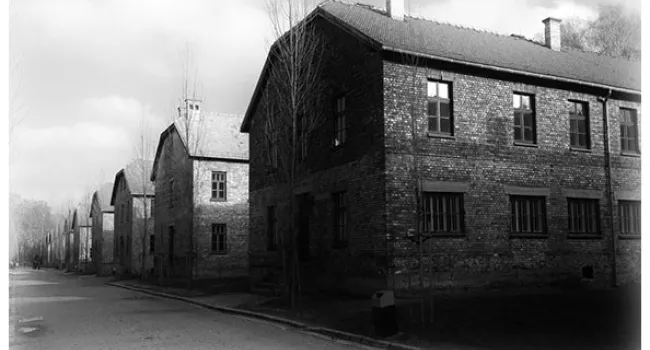00:00
It sustained us...our
body was able to absorb it.
00:00
(male speaker)
Those who survived could
answer the roll call
00:05
of all the
nations of Europe,
00:08
all religious faiths,
all political beliefs,
00:10
condemned by Hitler
because they were anti-Nazi.
00:17
And now they
were free.
00:20
(Bluma)
This American
from Red Cross
00:29
He called out the few
of us that could walk,
00:34
and we stood
around him,
00:36
about maybe 10, 12 girls
standing around him.
00:40
He called me out,
and he talked to me.
00:44
He said,
"How old are you?"
00:46
I told him,
and he said,
00:50
"Do you have anybody...
is your mother here?"
00:54
I said, "No,
I lost everybody.
00:57
I have a sister
who has typhoid fever."
01:01
I thought
to myself,
01:05
If I live to see a soldier,
I'll kiss his feet.
01:12
But I couldn't
get up.
01:15
I had very high fever, and
then I think Bluma walked over.
01:23
I'm sorry
to make you cry.
01:26
(female interviewer)
It's okay.
01:29
Anyway, they took
us to a hospital
01:34
where they gave us
a bath and a clean bed.
01:42
They gave us
the first food.
01:46
I remember it was,
I think, rice and milk.
01:55
I couldn't believe--
to see that.
01:59
They gave me some,
and I started eating,
02:03
and my stomach
wouldn't take it.
02:13
The people liberated by
the Americans had better luck.
02:17
They were taken
to a special home
02:20
where they
could recuperate.
02:22
They were given
medication, food.
02:24
The Russians liberated
the place and left.
02:28
On Friday morning,
on April 11th of 1945,
02:32
we saw the first
American walk into....
02:43
We saw the first American
walking into Buchenwald.
02:48
That was a day
I'll never forget.
03:01
(male speaker)
In the official report,
03:04
the Buchenwald camp is termed
an extermination factory.
03:07
The means of extermination...
starvation
03:10
complicated by hard work,
abuse, beatings, and tortures,
03:13
incredibly crowded
sleeping conditions,
03:15
sicknesses
of all types.
03:17
One thousand boys
under 14 years of age
03:21
are among the
20,000 still alive.
03:24
(Horrace Berry)
We were part of the
71st infantry division
03:28
of the Third Army,
which was Patton's army.
03:32
The tank people were
moving forward real fast.
03:36
The enemy
was retreating.
03:38
We were going through what
we call a sweeping operation.
03:42
We went in one town one morning
and did our standard procedure.
03:48
When we were leaving,
we ran into some refugees,
03:52
the first I saw
of people of this camp.
03:56
They had on striped
clothes underneath
their ragged clothes,
04:00
and they
were starved.
04:03
There weren't many
of them at that time.
04:06
Some of us had chocolate bars
and cigarettes they gave them,
04:12
and they ate
the cigarettes.
04:14
The chocolate bars
were too much.
04:17
They got stomach cramps
and just turned over.
04:21
Some of them
died on the road.
04:24
It was
just too much.
04:26
Being a Jew myself,
it just didn't sink into me
04:31
that this is what is
happening to my people.
04:35
It did not sink in what
had happened for days later.
04:40
My conscience
bothered me.
04:42
These living human beings
were murdered, massacred,
04:45
just because they belonged
to a different faith,
04:49
or minorities,
or whatever they were.
04:52
(Claude Hipp)
Our division moved forward.
04:55
One of our
regiments stumbled
04:57
into one of the greatest sores
in Europe that you can imagine.
05:03
It was a work camp that had
been run by the German SS
05:09
outside a small town
called Orsdorff.
05:14
When our unit went in,
we found this compound
05:18
completely filled with
hundreds of dead bodies.
05:23
What in the world
can make men, or people,
05:27
do this to
other people?
05:30
(Alan Wise)
We had been ordered to take
the town of Gardelegen.
05:36
We was at a Luftwaffe
airport nearby.
05:41
About 300 of the people
who were murdered there
05:47
were still
in the barn,
05:50
and I went up to see
what it looked like.
05:54
I saw these people
all piled up.
06:01
Initially, there was
about 2,000 of them
06:04
who were
east of Berlin
06:07
working in an
aircraft parts factory,
06:11
political prisoners
and slave labor.
06:14
As Russians approached, they
tried to stay ahead of them.
06:19
They finally
reached a point
06:21
that they had gone as
far west as they could
06:26
because we
were coming.
06:28
That's what happened
at Gardelegen.
06:34
We were approaching
from the west,
06:36
and they couldn't
go any further,
06:39
so they did
away with them.
06:43
In talking
to soldiers there,
06:45
we first thought
it was flamethrowers,
06:48
but then I figured it
couldn't be a flamethrower
06:52
because it would have
engulfed the whole body.
06:56
These were burnt
from the waist down.
07:00
They apparently put
straw in these buildings--
07:03
this building,
I should say--
07:08
closed the doors where these
people could not get out.
07:12
These individuals tried
to claw their way out,
07:16
digging the dirt
to get out.
07:19
It was estimated there
was 1500 people burnt alive,
07:23
but the final count, I believe,
came up to 1800 people.
07:28
What amazed me is,
Why did they do this?
07:32
The war was
winding down.
07:36
They were burnt
the night we arrived.
07:40
We arrived in the wee
hours of the morning,
07:44
and they started burning
that night before.
07:47
We did make the Germans
in the town come to the site.
07:54
Of course,
they didn't want to.
07:58
We made them bury each body
in an individual grave.
08:06
Nobody was ever
a Nazi...nobody.
08:11
They all denied knowledge
of what was going on.

